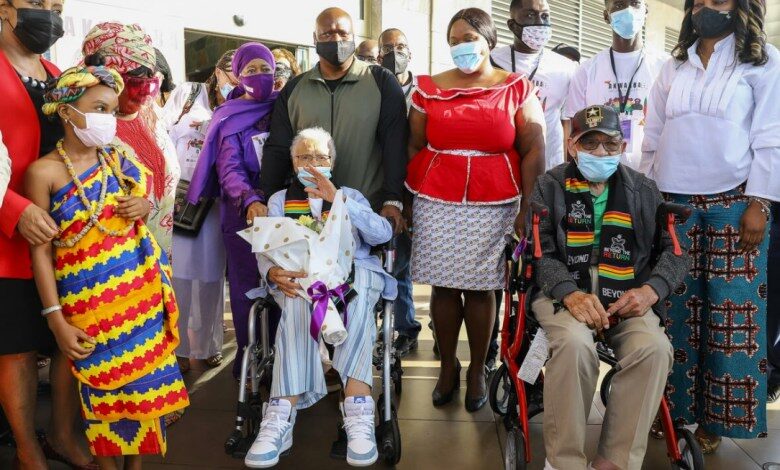Ghana welcomes survivors of 1921 Tulsa Race MassacreGhana welcomes survivors of 1921 Tulsa Race Massacre

Ghana has welcomed survivors of the 1921 Tulsa Race Massacre Viola Ford Fletcher, who is 107 years old, and her brother Hughes Van Ellis, 100 years old.
The two are the last known living survivors of the 1921 racist massacre in Tulsa, Oklahoma.
This is the first time they are stepping on African soil, and it is for a tour of Ghana. The visit is part of a “homecoming” campaign organised by the social media platform Our Black Truth.
“I think this is one of the biggest historic African diasporas that has come back to us,” said Nadia Adongo Musah, deputy director of the Diaspora Office in the Office of the President.
“When the president made the announcement on Beyond the Return in 2018 in DC, and celebrating Beyond the Return in 2019, we never thought that one of our siblings who was taken away generations on from that, 107 years old, would have the passion and interest to visit Ghana. Not only by herself, but also bringing along her younger brother, who is 100 years old.”
400 years later
Fletcher and Ellis were accompanied by their grandchildren on a week-long trip to the West African nation as part of a government campaign to attract people of African heritage living abroad “back home”.
The siblings landed in Accra, Ghana’s capital, on Saturday with beaming smiles, waving from their wheelchairs to onlookers at airport who cheered, “Welcome home.”
“It’s my first time on the continent of Africa and I’m just thrilled to be here,” said Ellis’s daughter Mama.
As they made their way out of the airport, the survivors were given flowers and sashes saying “Beyond the Return”, a reference to the government campaign launched in 2019, four centuries after the first slave ship landed in what is now the United States.
“My grandparents are extremely excited to be home for the first time on the motherland,” said Fletcher’s grandson Ike Howard. “If you haven’t visited Africa, this is the time to come.
“We’re in the middle of a pandemic but tomorrow is never promised to anyone.”
Lifelong dream
Viola Fletcher said she relives memories of the massacre every day.
“On that first night, in 1921, I went to bed in my family’s home in Greenwood,” she recalled, in a statement published by the Diaspora African Forum.
The non-profit organisation co-sponsored the trip with Our Black Truth, a social media platform where African descendants can learn about their history.
“I had everything a child could need … But within a few horrible hours, all of that was gone,” said Fletcher.
“Now after all these years, I’m so happy to be fulfilling a lifelong dream of going to Africa and I am so pleased that is to beautiful Ghana.”
Symbolic titles
Ghana has long played a role as a hub of thought and memory for the broader black community.
The American writer and civil rights activist Maya Angelou lived in Accra in the early 1960s.
On 31 May 1921, a group of black men went to the Tulsa courthouse to defend a young African-American man accused of assaulting a white woman. They found themselves facing a mob of hundreds of furious white people.
Tensions spiked and shots were fired, and the African Americans retreated to their neighborhood, Greenwood.
The next day, at dawn, white men looted and burned the neighbourhood, at the time so prosperous it was called the Black Wall Street.
In 2001, a commission created to study the tragedy concluded that Tulsa city officials themselves had armed some of the white rioters.
Historians say that as many as 300 African-American residents lost their lives, and nearly 10,000 people were left homeless in the 1921 incident that pitched the white against the black.





